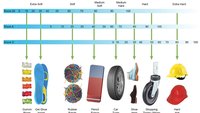"Nuclear blast devastates campus"
After the morning computer science lesson a student accidentaly dropped his nuclear empowered laptop on campus which led to an nuclear blast. The surrounding people were struck down but luckily no one was injured apart from the common contamination.
laptop battery that would last 4 million hours, but....
"Nuclear blast devastates campus"
After the morning computer science lesson a student accidentaly dropped his nuclear empowered laptop on campus which led to an nuclear blast. The surrounding people were struck down but luckily no one was injured apart from the common contamination.
I'm hoping you're being sarcastic, but a lot of people think this kind of thing would
be possible. They don't realize the technology involved in splitting atoms.
I think the problems associated w/ this kind of battery would be disposal. But since
it works on the decay of a nuclear substance, I wonder if it would still be harmful
even after the battery died, or is it still radioactive even after it can no longer
produce power?
.
.
.
.
"i surf because, i"m always a better person when i come in"-Andy Irons
.
.

.
"Nuclear blast devastates campus"
After the morning computer science lesson a student accidentaly dropped his nuclear empowered laptop on campus which led to an nuclear blast. The surrounding people were struck down but luckily no one was injured apart from the common contamination.
Yah, I suppose that could happen …
Um, IF the battery were made of weapons grade fissionables in amounts greater than critical mass.
:rolleyes:
Kn.
When one person suffers from a delusion, it is called insanity.
When many people suffer from a delusion, it is called religion.
warning: conspiracy theory ahead
So, "they" have the technology to make a battery last a long time already, but
they're big. Now I figure we can already have cars that have nuclear batteries
that last for decades if not longer without needing a charge, but we'd all need to
drive big cars that can hold the large battery. But, we would no longer be producing
hydrocarbons or NO2 or any other greenhouse gas or pollutant. All we need to do
is make sure they're packaged in a container that can withstand a crash (like the
data recorder on a plane or ship).
"We" have this technology already and the batteries look like they're going to
start getting smaller now, so what's stopping us from going in that direction?
Fear of nuclear waste. My question is; is this a really big issue, something that
isn't easily surmountable, or is it something more sinister?
Who would NOT want us to have nuclear batteries in our cars?
-Governments, they have too much invested in oil companies.
-Oil companies
-Banks (how much do they make every time we put our credit card in to fill up at the gas station?)
-Battery makers (how many less would they be selling?)
-I'm sure I'm forgetting some others
So, are we afraid of a "real" risk from low grade nuclear batteries for a reason,
or have we been conditioned to believe that way by our overlords so that we
will feel helpless and thus more easily controlled? We're not talking about fission
reactors, just using nuclear decay to produce electricity, right? When I was in
the US Coast Guard, we had a exit sign that did so because it was radioactive
it never needed recharging.
.
.
.
.
"i surf because, i"m always a better person when i come in"-Andy Irons
.
.

.
I am pretty sure the issue is availability of these materials, look at the issue recently with mediacal isotopes, also i belive nasa is having difficulty securing these for their probes.
Thanks to the AECL, the cost just went throught the roof.
Life is like riding a bicycle in order to keep your balance, you must keep moving.
A. Einstein
I am pretty sure the issue is availability of these materials, look at the issue recently with mediacal isotopes, also i belive nasa is having difficulty securing these for their probes.
I think that may be because of government control more than quantity, no?
Also, it's a pretty limited consumer base right now. If it went main stream, price
may go down?
.
.
.
.
"i surf because, i"m always a better person when i come in"-Andy Irons
.
.

.
i didn't realize J-Kwon was a scientist in missouri
The Missouri team, led by Jae Wan Kwon
We don't know what our limits are, so to start something with the idea of being limited actually ends up limiting us.
Ellen Langer
I'm hoping you're being sarcastic, but a lot of people think this kind of thing would
be possible. They don't realize the technology involved in splitting atoms.I think the problems associated w/ this kind of battery would be disposal. But since
it works on the decay of a nuclear substance, I wonder if it would still be harmful
even after the battery died, or is it still radioactive even after it can no longer
produce power?
sarcastic, yes. I was thinking in a comic-strip way.
After disposal they are still radioactive but with lower intensity than mentioned above. Anyway if they are piled up they are more harmful than beeing scattered.
The question is if the cut backs in "recycling" and (restircted) useability will be tolerable compared to the gain of a powerful energy source…
I am pretty sure the issue is availability of these materials, look at the issue recently with mediacal isotopes, also i belive nasa is having difficulty securing these for their probes.
Medical isotopes and the material that power this thing (I would suspect plutonium, but I'm not too sure) are very different.
Medical isotopes: Rapid decay, so they don't stick around for a long time when they get injected into you for treatment/diagnosis. They're hard to supply because you need new material every day.
Nuclear batteries: Long decay, so they can power your iPod for 4 million years without having to change the material every day
http://www.cyberetrothreads.com
ya fuck you windows. fuck you too door.
Who would NOT want us to have nuclear batteries in our cars?
-Governments, they have too much invested in oil companies.
-Oil companies
-Banks (how much do they make every time we put our credit card in to fill up at the gas station?)
Yep, and these same people have huge amounts of power over the world. Our lives are basically a business transaction to them. Our whole economy is so oil dependent. How much of the money you spend do you think ends up in their pockets?
We're born, make money, give them most of it, and die. And I don't doubt that these people will do anything to keep it that way.

warning: conspiracy theory ahead
"Large" in case of batteries usually means: F*ing heavy!
The problem with these radioactive batteries is that they only produce a small amount of electricity, but do so over a long timeframe. Nice for stuff like watches, pacemakers or ipods, but not terribly useful for high-energy applications like cars.
We don't want a car to take 2 hours to go from 0-50. Even if it could stay at that speed for 6 years non-stop.
Plus each of those cars would carry enough toxic isotopes to contaminate half a province for the next 500 years.
"Large" in case of batteries usually means: F*ing heavy!
The problem with these radioactive batteries is that they only produce a small amount of electricity, but do so over a long timeframe. Nice for stuff like watches, pacemakers or ipods, but not terribly useful for high-energy applications like cars.
We don't want a car to take 2 hours to go from 0-50. Even if it could stay at that speed for 6 years non-stop.
Plus each of those cars would carry enough toxic isotopes to contaminate half a province for the next 500 years.
The whole idea behind the paper I posted that the batteries were getting smaller
and lighter. If they can power spacecraft and such I'm sure if they made them
smaller and thus lighter they could power a car.
Thing is, do any of "us" really know how bad these isotopes are? How many of
us have a degree in nuclear technology?
The question was behind the "conspiracy theory" is that "WE" don't really know
anything but what our government tells us. Any science minded person can
tell you that there is a huge difference between radioactive substances and how
they are used, but we don't know which ones are harmful and for how long or
how difficult disposal for the ones in question are. There are 38 different radioactive
elements so how do we know?
.
.
.
.
"i surf because, i"m always a better person when i come in"-Andy Irons
.
.

.
"Large" in case of batteries usually means: F*ing heavy!
The problem with these radioactive batteries is that they only produce a small amount of electricity, but do so over a long timeframe. Nice for stuff like watches, pacemakers or ipods, but not terribly useful for high-energy applications like cars.
We don't want a car to take 2 hours to go from 0-50. Even if it could stay at that speed for 6 years non-stop.
Plus each of those cars would carry enough toxic isotopes to contaminate half a province for the next 500 years.
You could solve this with a capacitor bank, so when the car wasn't in motion (parked) you'd be charging the capacitors. Then throw in regenerative braking and you're probably golden. BUT, I'd be more worried about part 2 of your statement. That would be ALOT of radioactive material. Cleaning up this stuff and "disposing" of it (yeah right, it's not really disposal. They just move it around.) is tough. I was recently reading about the cleanup at Hanford. It's rediculous. Nuclear power IMHO is a short term gain/longterm loss. Untill we develop a cannon that can fire the depleted material into space or something I think we're kinda screwed.

alright!!!
You could solve this with a capacitor bank, so when the car wasn't in motion (parked) you'd be charging the capacitors. Then throw in regenerative braking and you're probably golden. BUT, I'd be more worried about part 2 of your statement. That would be ALOT of radioactive material. Cleaning up this stuff and "disposing" of it (yeah right, it's not really disposal. They just move it around.) is tough. I was recently reading about the cleanup at Hanford. It's rediculous. Nuclear power IMHO is a short term gain/longterm loss. Untill we develop a cannon that can fire the depleted material into space or something I think we're kinda screwed.
See, this is the difference between nuclear batteries and a nuclear power plant.
The plutonium in used in a nuclear power plant is highly concentrated and refined.
Enough to produce the act of fusion, which is what creates the toxicity of it's
own waste.
We already use radioactive substances in our day to day lives (smoke detectors,
pacemakers, etc).
I don't know how concentrated the material for these batteries are, but, if they
are just naturally occurring radioactive elements that are being used, then they
are in decay in the ground and we are wasting this energy no? Also, disposal could
be as easy as burying it back where it came from, no?
It seems to me that as the larger car powering batteries start to decay too much
to power a vehicle, the "battery recycling" people could use them to power smaller
articles, or put them in a bank to run non-mobile items.
How much more involved is cleaning up this substance (whatever it is, we don't
know) than say all the billions of lithium ion, lead/acid, etc batteries that are
already out there? Again, we don't know. We hear "nuclear" and assume it's
Hiroshima or 3-mile island kind of materials. I know people that won't use a
microwave because it uses "radiation" to cook food.
EDIT: Here's an interesting read (I'm still reading it)…http://www.scribd.com/doc/8929973/Nuclear-Battery
.
.
.
.
"i surf because, i"m always a better person when i come in"-Andy Irons
.
.

.
Forum jump:







